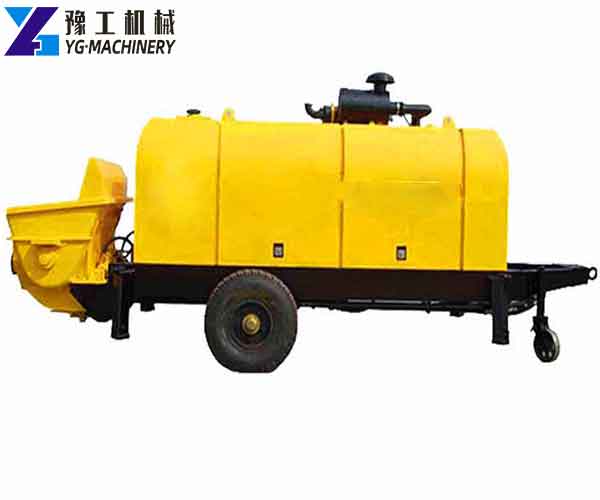
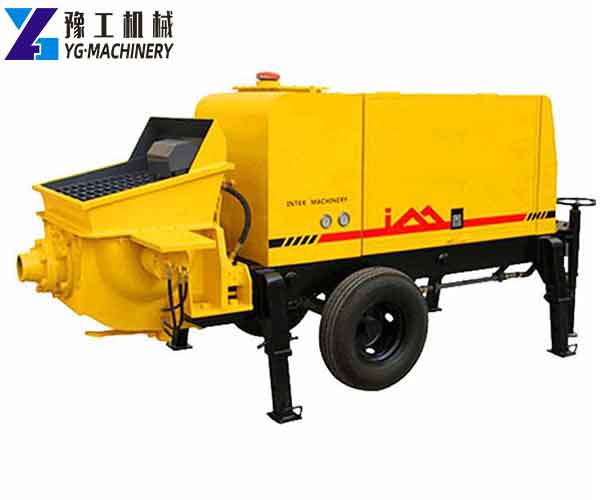
The new small concrete pump is suitable for super-high-rise fine stone concrete conveying, construction floor group construction column pouring, is currently the smallest concrete pump in China, mainly for some special constriction conditions or narrow space construction conditions subject to equipment size High-size products are carefully designed to cause inconvenience in construction or difficult to complete the construction schedule. Small concrete pump for sale in YG Machinery, also we have the concrete mixer with pump, the most professional staff, and the best machines.【WhatsApp/WeChat/Phone/Skype】+86 136 1385 6800
Parameter of Small Concrete Pump in YG:
| Model | YG-20 | YG-30 | YG-40 | YG-50 |
| Motor power | 22KW | 37KW | 45KW | 55kw |
| Maximum outlet pressure | 26mpa | 28mpa | 28mpa | |
| Maximum theoretical throughput | 16-18m³/h | 20-22m³/h | 35m³/h | |
| The maximum particle size of aggregate | ≤20mm | ≤30mm | ≤40mm | |
| Vertical conveying distance | 40m | 80m | 120m | 150m |
| Horizontal conveying distance | 80m | 140m | 2600m | 300m |
| Diameter of conveying pipe | 80mm | φ80 (100) mm | φ100 (80) mm | Φ125/100mm |
| Whole machine weight | 1600kg | 2200kg | 2400kg | 2500kg |
| Dimensions | 3400x1200x1600mm | 3600x1500x1600mm | 4000x1500x1550mm | 4200*1700*1750mm |
Small Concrete Pump Main Applications and Uses:
Diesel concrete pump is widely used in-floor heating, heat insulation, and light foaming cement, transportation of mortar and small orthopedic concrete, transportation of fireproof and thermal insulation materials, concrete scale transportation of various construction projects, and transportation of high-rise building mortar and fine stone concrete. Secondary structural column filling, various pressure grouting in reservoirs, hydropower stations, ports and wharves, foundation treatment, weak foundation, reinforcement grouting, tunnel, subway, backfill grouting anchor support in mine construction of filled layers or mortar-filled layers.
Small Concrete Pump Performance Characteristics:
- Adopt S tube form distribution value to meet the pumping of small aggregate concrete and mortar.
- The main oil pump adopts a deformed plunger pump, which has high efficiency and high pressure.
- The hydraulic system adopts independent three-loop control, high-reliability glasses plate, and cutting a ring with hard alloy, wear resistance, and long service life.
- The pumping mechanism adopts a double-cylinder piston type with advanced performance and good continuity.
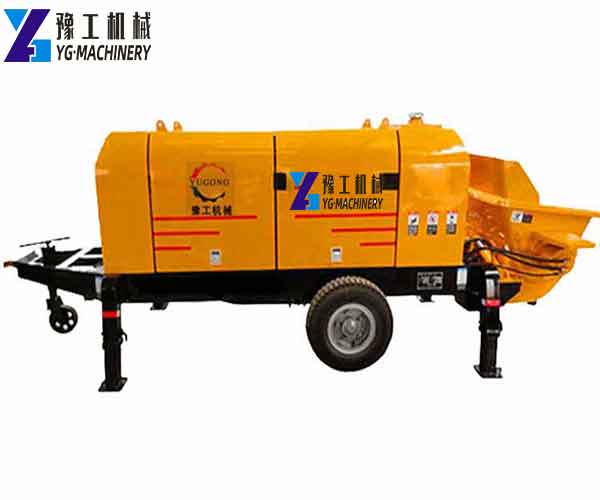
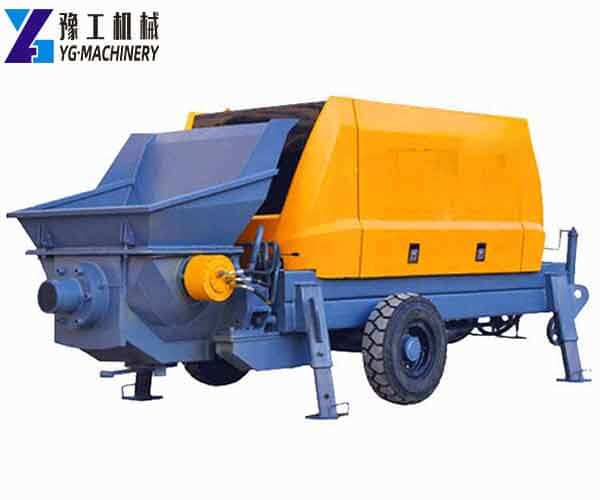
Small Concrete Pump Function:
- The special pouring pump for secondary structure fine stone mortar can realize the transportation of fine stone concrete and mortar for long-distance high-rise buildings.
- The distribution valve adopts an advanced S-tube valve, which has good sealing performance and a simple and reliable structure. The eye plate and the floating cutting ring are made of hard alloy, which has good wear resistance, long service life, and convenient replacement. The cutting ring adopts an automatic compensation gap structure.
- The control mode uses electro-hydraulic control, with perfect electro-hydraulic overload protection and an instrument display system; it has an anti-pump operation function, easy to eliminate blockage faults; pumping speed can be adjusted to meet various working conditions.
- The centralized lubrication system is automatically controlled by the program to start and stop and run time, effectively extending the service life of the rotating parts.
- Electrical components such as contactors and push-button switches are reliable in operation, simple in the control circuit, and equipped with switches for easy operation.
- The main sealing parts are made of high-quality seals to prevent internal and external leakage of the hydraulic system.
Maintenance Method of Diesel Concrete Pump:
- First, the lubricating oil in the bearing housing should be replaced regularly, and the normal condition is replaced once every 6 months.
- Secondly, there is no water trace on the motor to prevent the motor from being damp. After damping, it will affect the use and safety of the device.
- In the cold season, if there is ice formation after stopping the pump, the cooling water at the seal should be turned on first. If necessary, the water can be heated to thaw. After that, the coupling is moved by hand until it is flexible and then drives according to the startup procedure.
- The pump with a cooling water device should be connected to the cooling water before driving. When the pump is running normally, it can continue to be connected. If the conditions are not allowed, they can be stopped.
- The operation of the pump when closing the outlet valve is called the closed-pressure operation state. The closing operation time of the whole plastic pump or the plastic-lined pump should be shortened as much as possible. The medium temperature medium should not exceed 5 minutes.
- The temperature medium should not exceed 2 minutes.
- Finally, the pump cannot bear the weight of the inlet and outlet pipes. The shorter the inlet pipe, the better. The vertical height of the pump outlet to the valve should be as short as possible.
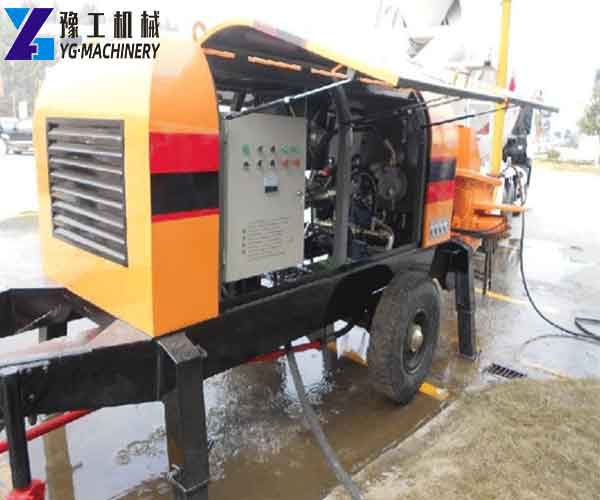
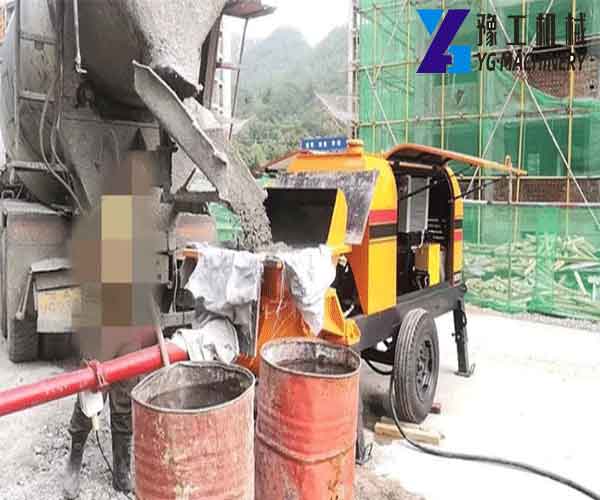
Precautions After the Diesel Small Concrete Pump is Stopped:
- Clean and rinse the concrete remaining in the concrete tank and pipeline immediately after the end of the pumping concrete work.
- When cleaning with compressed air, it must be carried out in strict accordance with the operating regulations. The operator must leave the tube end, not close it, to avoid airflow injury.
- In the winter, all the water on the pump should be drained to avoid freezing and cracking the parts.
- In the after-hours maintenance work, such as fastening parts, lubricating the moving parts, etc., it should be determined that the motor can stop rotating.
Diesel Small Concrete Pump for Sale in YG Machinery Tips:
- Operators of diesel concrete pumps for construction and related equipment management personnel should carefully read the instruction manual, master the relevant principles of structural principles, use, and maintenance, and pumping concrete; when using and operating concrete pumps, strictly follow the instructions for use. Carried out. Since the operator needs to have a complete understanding of the mechanical properties, the instruction manual should be used at random. At the same time, special operating points should be set according to the instruction manual to achieve some effective control of some variable factors in the pumping technology, such as pump position and piping layout.
- The ground supporting the concrete pump should be flat and solid; the whole machine should be placed horizontally and should not be inclined during the work. The legs should be able to support the machine stably and be securely locked or fixed. The position of the pump should be convenient for the concrete mixing truck to enter and exit the hopper and feed the hopper. It is also considered to be beneficial to the pumping pipe and reduces the pumping pressure loss. At the same time, it is required to be close to the pouring place, and the power supply and water supply are convenient.
- Piping should be carried out according to the characteristics of the construction site and the concrete pouring plan. When designing the piping, it is necessary to check whether the horizontal conversion distance of the pipeline is compatible with the pumping distance of the concrete pump. Pipe length should be shortened as much as possible, and bends and hoses should be used less. The laying of the conveying pipe should facilitate pipe cleaning, troubleshooting and disassembly, and repair. When the new pipe is used in combination with the old pipe, the new pipe should be placed at a higher pumping pressure. A piping diagram should be drawn during the piping process, listing the specifications and quantities of various fittings, pipe clamps, elbows, and hoses, and providing a list.
- When the vertical pipe is required, as the height increases, the potential energy increases and the concrete tends to flow back. Therefore, a horizontal pipe of a certain length should be laid between the concrete pump and the vertical pipe to keep enough resistance to prevent the concrete from flowing back. When pumping high-rise concrete, it is necessary to vertically pipe upwards. At this time, the length of the horizontal pipe on the ground should not be less than 1/4 of the length of the vertical pipe. If the water pipe of the above-required length cannot be placed due to the limitation of the site, an elbow or hose may be used instead.

